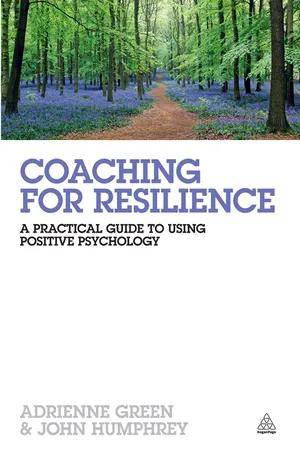01
Defining ‘resilience’ and ‘stress’
So far we’ve been talking about ‘resilience’ and ‘stress’ as if we could take it for granted that we all mean the same things by those words. That isn’t necessarily the case. When we ask people in our groups to define resilience and stress, they often come up with meanings that are close to or the same as our own; but sometimes they are quite different, especially with the word ‘resilience’.
Obviously we will be making lots of suggestions about ‘managing stress’ and ‘building resilience’ throughout this book. If you have a different view from us about what we are trying to help you manage and build then you might find our approach a bit confusing. So before we go any further we should define exactly what we mean by these terms so that our goals and approach will make sense to you.
Resilience
1. What is resilience?
We’d like to give you a chance to think about your own definition of ‘resilience’ before we reveal the one that we are using for this book. You’ll find that ours is taken from a dictionary. But, rather than go to a dictionary right away yourself, it would be interesting to explore your own personal sense of what ‘resilience’ means.
To find your own definition it might help to think about people whom you would say are resilient. Could you name a famous person you regard as resilient?
Write their name here ........................................................................................
Could you name someone you know personally whom you think is resilient?
Write their name here .............................................................
Now write down a few words or short phrases that describe these people and why you think they are resilient.
..........................................................................................................................
..........................................................................................................................
..........................................................................................................................
..........................................................................................................................
We have found that the famous people most often named in this exercise are Margaret Thatcher and Nelson Mandela. The reason people give for pointing to Margaret Thatcher is that she was mentally and emotionally ‘strong’. She took tough decisions, stuck to her own views and was unmoved by criticism. The reason they give for identifying Nelson Mandela is that, despite many years of imprisonment and isolation, he came back with renewed energy and an inspirational vision for the future of his country.
You may not have named Mrs Thatcher or Mr Mandela specifically as your famous person, but did you write down any of the qualities above to describe them? People in our groups most commonly note either ‘strength’ or ‘the ability to bounce back’ as the key features of resilience. We would agree with one of these.
Our definition of resilience
In the strict dictionary definition of resilience, ‘strength’ is not the crucial aspect of resilience. Much more important is the ‘ability to bounce back’. In fact the definition from the Shorter Oxford English Dictionary is:
1 The act of rebounding or springing back; rebound, recoil.
2 Elasticity; the power of resuming the original shape or position after compression, bending etc.
This is what we mean when we talk about ‘resilience’ in this book. It is not the same as strength, which enables you to remain calm, unaffected, or ‘stony’ in the face of life’s difficulties and challenges. Rather it is that you are moved emotionally by those difficulties – you feel pain, anxiety, fear, sadness, even despair – and then can recover to your original state.
At its best resilience enables a person to recover to an even more resourceful state. This happens when the person can use a difficult experience to become more aware of their personal qualities, skills and abilities, and is able to use those more readily and fully when they are challenged again in the future.
So it is possible for a person to be strong and yet not very resilient. A strong person is like a rock; hard, tough and unbending. That rock won’t be pushed or pulled out of shape by pressure, but hard knocks can chip away at it and once it is chipped it stays chipped. It might take a very powerful hit to break it completely but when it is broken it cannot put itself back together again. This is not our goal for you.
A person who is resilient may not appear to be very strong. That’s because they bend and give way. They react to what happens to them emotionally and physically. They are like an elastic band that can be pulled, stretched, twisted and scrunched – but then will go back to its original shape when it is let go.
Of course it is possible to break an elastic band. You could stretch it beyond its flexibility until it snaps, or pull at it repeatedly until it loses its elasticity and can be broken easily. In the same way, even very resilient people have their limits. The truth is that everyone can be broken by events that are beyond endurance for them.
Our goal is to work with you to build the power and toughness of your resilience. We want you to be like an elastic band that is extremely thick and strong so it will be very difficult for life to stretch you beyond your breaking point.
You might be pulled out of shape by life events. By this we mean you may become very emotional at times. You might need to seek help. Or you might need to withdraw and take some time out for a while. But then you will come back with new vitality and resolve, just like Nelson Mandela.
2. Where does resilience come from?
We touched on this question earlier when we explained our appr...
